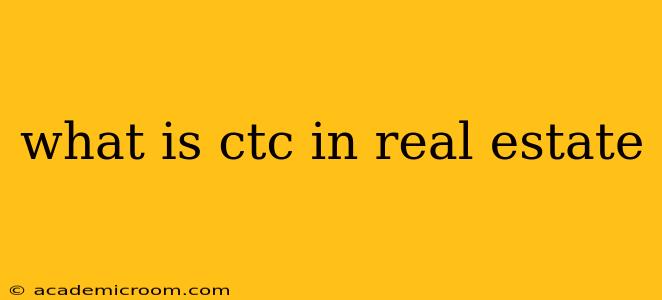In the bustling world of real estate, understanding the terminology is crucial. One term that often arises, particularly in discussions surrounding closing costs, is "CTC." But what exactly does CTC mean in real estate? Simply put, CTC stands for Closing Table Costs. These encompass all the expenses associated with finalizing a real estate transaction, paid by either the buyer or the seller (or sometimes split between them). It's a comprehensive overview of every fee involved in getting the keys to your new home or completing a property sale.
Understanding CTC is vital for both buyers and sellers. For buyers, it helps in budgeting for the total cost of homeownership beyond the purchase price. For sellers, it ensures a clear understanding of the net proceeds they will receive after the sale. Let's delve deeper into the specifics.
What Costs are Included in CTC?
The exact components of CTC can vary depending on location, the type of property, and the specifics of the transaction. However, common costs included in CTC typically include:
Buyer's CTC:
- Loan Origination Fees: These fees cover the lender's administrative costs for processing your mortgage application.
- Appraisal Fees: The cost of having a professional appraiser assess the property's value to ensure it aligns with the loan amount.
- Title Insurance: Protects the buyer from potential title defects or claims against the property.
- Home Inspection Fees: Paying a professional to inspect the property for any structural or other issues before closing. (Note: this is often done before the final closing table)
- Escrow Fees: Fees paid to the escrow company or closing agent for managing the transaction's financial aspects.
- Property Taxes (Prorated): The portion of property taxes the buyer owes for the remaining time in the tax year.
- Homeowners Insurance (Prorated): The portion of homeowners insurance premiums the buyer owes for the remaining time in the policy year.
- Recording Fees: Fees paid to record the deed transfer with the local government.
Seller's CTC:
- Real Estate Agent Commissions: Fees paid to the listing agent and the buyer's agent.
- Title Insurance: Protects the seller from potential claims against the property related to issues before the sale.
- Transfer Taxes: Taxes levied by the state or local government on the transfer of property ownership.
- Escrow Fees: Fees paid to the escrow company or closing agent for managing the transaction's financial aspects.
- Property Taxes (Prorated): The portion of property taxes the seller owes up to the closing date.
- Payoff of Existing Mortgage: If the seller has an existing mortgage on the property, the CTC will include the amount needed to pay it off.
What is NOT Typically Included in CTC?
It’s important to note that some expenses are not typically part of the CTC, though they may be related to the overall home buying or selling process. These often include:
- Moving Expenses: The costs associated with relocating.
- Home Improvements or Repairs: Costs of fixing up the property before or after the sale.
- Furniture or Furnishings: Costs of buying new furniture or appliances for the property.
How Can I Estimate My CTC?
Estimating your CTC requires gathering information specific to your situation. You'll want to talk to your real estate agent, mortgage lender, and closing attorney/escrow company to get a detailed breakdown of expected costs. Many lenders will provide an estimate of closing costs during the mortgage pre-approval process. Remember, these are estimates, and the final amount can vary slightly.
What are some common questions about CTC?
How much should I expect to pay in CTC?
The amount you'll pay in CTC varies widely depending on location, the price of the home, and the type of financing. As a general rule, buyers often expect to pay between 2% and 5% of the home's purchase price in closing costs, while sellers' costs are generally lower but can still be substantial. A detailed breakdown is always the best approach.
Who pays closing costs?
The allocation of closing costs is often negotiated between the buyer and seller as part of the purchase agreement. In some cases, the seller will pay all or a portion of the buyer's closing costs to make the home more attractive. This is often expressed as a seller credit and should be clearly documented in the contract.
Can I negotiate CTC?
While you may not be able to significantly negotiate every aspect of CTC, there's sometimes room for discussion, especially regarding the allocation of costs between buyer and seller. Your real estate agent can help navigate these negotiations.
By understanding CTC and its components, buyers and sellers can approach the real estate transaction with confidence, knowing what to expect and how to prepare financially. Remember to always obtain detailed estimates from relevant professionals to avoid any surprises at closing.
